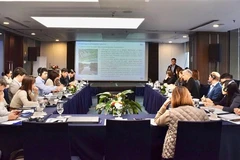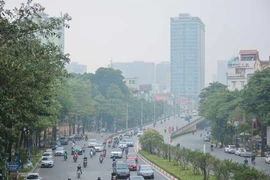According to the municipal Department of Natural Resources and Environment, Ho Chi Minh City releases about 500,000cu.m of industrial waste water and 1.2 million cu.m of waste water from households and other sources a day.
The untreated waste water is released directly into rivers and canals, badly polluting the environment. Experts warned that the southern hub would have to pay a high price if urgent action is not taken to protect its precious natural resources.
Speaking at a recent seminar, Associate Professor Nguyen Phuoc Dan of the Ho Chi Minh City University of Technology said the potential for recycling the city's waste water for reuse is very large.
The recycled waste water can be used for washing streets, irrigating parks and street-side trees and gardens, flushing the toilet, washing clothes and other purposes, he said, adding recycled waste water should be promoted as a very useful product.
If the city can recycle 1 million cu.m of waste water a day, it can save about 10 billion VND (476,000 USD) a day, participants said at the seminar.
They said the city can also reduce its dependency on water from the Tri An and Dau Tieng reservoirs and reduce ground water pollution.
Ho Chi Minh City now uses fresh water from the Dong Nai and Sai Gon rivers, Tri An and Dau Tieng reservoirs, rainwater and groundwater. The exploitation of fresh water from the Dong Nai River and Tri An Reservoir for use in the southern hub has increased from 33cu.m per second to 51cu.m per second over the past 10 years, according to the city's Water and Environment Technology Association.
During this period, the exploitation of fresh water from the Sai Gon River and Dau Tieng Reservoir has also increased from 21cu.m to 33cu.m per second. The megacity's demand for clean water will continue increasing in the future because of its steadily increasing population, experts noted at the seminar.
They also said they have drafted four sets of criteria for recycled waste water for different uses including landscaping, industrial production, construction and daily urban use.-VNA
























